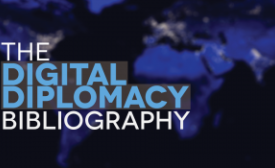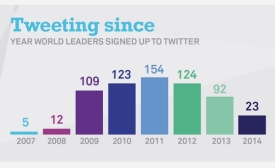twiplomacy

The most comprehensive bibliography of digital diplomacy to date.

Burson-Marsteller’s report, Twiplomacy Study 2014, is an annual study that looks at the global use of Twitter by world leaders as they exercise Digital Diplomacy. According to this study, more than half of the world’s foreign ministers from every region of the world and their institutions are active on Twitter. The report discusses how Twitter is fostering "virtual diplomatic networks" as well as social marketing campaigns that rely heavily on Hashtag Diplomacy.
Twitter has become an indispensable diplomatic networking and communication tool. According to the new study Twiplomacy, more than half of the world’s foreign ministers and their institutions are active on the social networking site. Here are five lessons from our world leaders on Twitter.
Twitter is changing how diplomats interact and influencing how we see global leaders. From embarrassing tweets and international spats, the public is getting to see a different side of diplomacy, says a new study.
The rise of social media in politics is no secret, and more and more world leaders are now turning to Twitter. According to Twiplomacy, a study by Burson-Marsteller, more than two-thirds (67.88%) of all heads of state and heads of government have personal accounts on the social network. For many diplomats, Twitter has becomes a powerful channel for digital diplomacy and 21st century statecraft. As of June 23, 2014, more than 80% of the UN member countries have a presence on Twitter.
Canada is among a small group of countries that have Twitter accounts for most of their embassies and missions, a global study revealed Wednesday. The study, called Twiplomacy and conducted by the public relations firm Burson-Marsteller, looked at the use of the microblogging site by heads of state and by governments and ministers of foreign affairs.







